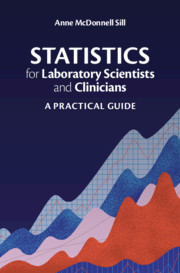This book targets researchers working in laboratory-based life science and medical research areas. The intention is to provide a concise and accessible guide for this audience so that they may understand the underlying principles of these statistical techniques and how to effectively apply these methods in their work. The author’s strengths are her extensive experience in helping such individuals with their statistical tasks, and her ability to understand their needs and to communicate effectively with them.
From the author’s 35 years of experience in the provision of epidemiological and statistical expertise to a multitude of audiences, her aim was to provide a statistical guide that would appeal to a wide variety of practicing, medical, and laboratory academicians and researchers. Providing links to online statistical tools,Footnote * this practical and interactive guide will act as a bench-side tool to assist the user in specific areas that are commonly used for interpreting results and preparing or reviewing manuscripts.
Intended key audiences include graduate students who lack the time to revisit their statistics books but need immediate consultation to complete the statistical section of their dissertations, scientists who evaluate a manuscript but fly past the statistical methods section due to their discomfort with statistics, and laboratory scientists who need to know how many specimens to include in an experiment to evaluate the sensitivity and specificity of a test against a gold standard. Readers should benefit from this interactive guide, which will quickly provide solutions to their many statistical inquires. A concise and well-organized guide should address the majority of statistical questions that these groups of professionals will encounter.
Step-by-step considerations are now available in this “how-to” guide. Now with the immediately available and free tools mentioned in this guide, those wanting to conduct such analyses can do so without seeking outside statistical consultation. But, more importantly, and in plain English, this guide will explain how to select the appropriate analytic approach to making sample size or power calculations. Immediately applicable, this guide covers the critical examples of the most commonly used techniques used to evaluate data in a simple and effective manner with online assistance.
The Accreditation Council for Graduate Medical Education (ACGME) requires that during their residency programs, physicians must engage in a scholarly activity and produce at least one published article to graduate from the residency program. Toward that goal, residents must often employ statistical techniques with which they may not be familiar. This guide would provide that statistical foundation. For the blood bank laboratorian who screens blood for infectious agents and who must calculate test efficiency, for the cardiologist who must know how many patients to randomize to drug A and drug B to demonstrate drug superiority or equivalency, and to the Institutional Review Board (IRB) reviewer who must evaluate study design and statistical approaches to determine risk and proper statistical methodology, a simple “quick read” of its concisely written sections should provide the reviewer with the confidence to accurately assess the integrity of the research protocol. Some might consider this guide a “necessity,” providing as it does an interactive and compact glance at most common statistical tools used in manuscripts, protocols, and scientific inquiry.
As an example, this guide will build upon the technicalities of the normal distribution simply to coach the reader to fully understand their data. Knowing the distributional normality of their data, or lack thereof, guides one to select the appropriate statistical test to analyze that data. Even seasoned scientists have often presented parametric tests on non-normally distributed data such as the log10 HIV viral load, which is a mathematical blunder that could have been avoided had they consulted a guide such as this.
So, at the urging of her colleagues, the author has downloaded her thoughts into this interactive guide so that colleagues can be directed to specific sections of the book, rather than continually having to ask her to calculate their 95% confidence intervals or to “power” their study. The premise of this statistical guide is to explain complex statistical topics in a manner that will not overwhelm or intimidate the medical professional with impenetrable statistical jargon, so that they can immediately apply these methods in their everyday practices.
* The full list of links is also available on www.cambridge.org/mcdonnellsill.
